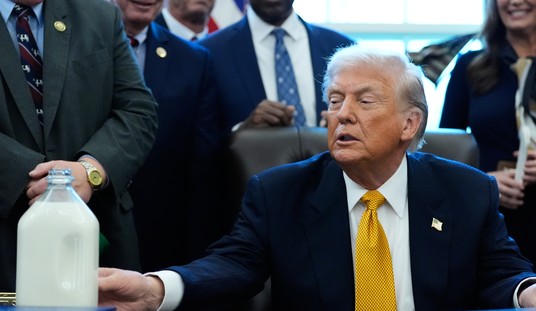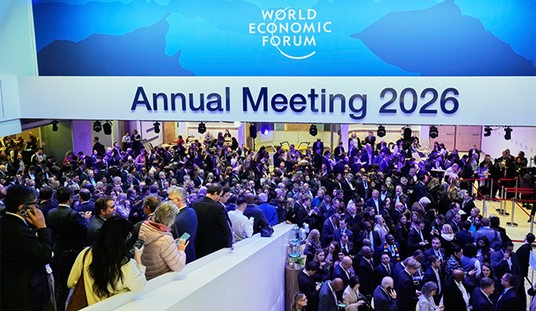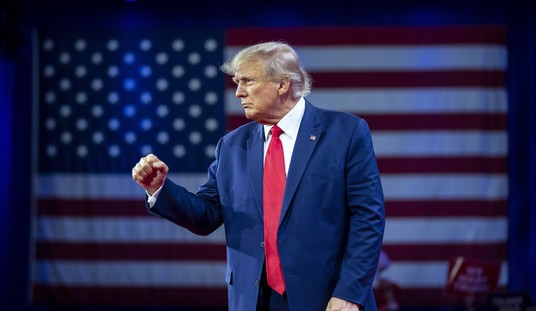John Kerry made the rounds of talk shows today after signing a deal with Iran last night to roll back their nuclear-weapons program … or perhaps more accurately, to pay Iran billions of dollars to roll back a few areas of progress for a short period of time. Candy Crowley notes on CNN’s State of the Union that nothing in this agreement requires Iran to actually dismantle its nuclear-weapons infrastructure, as the Libyans and the South Africans did when they ended their nuclear programs. Kerry essentially argues that this is a good start:
“It’s not an issue of trust. As the old saying goes of Gorbachev and Reagan, ‘trust but verify.’ Verification is the key. President Obama and I have said since the beginning, we’re not just going to verify, or trust and verify, we’re going to verify, verify, and verify. We have to know to a certainty so that Israel, Gulf States, ourselves — nobody can be deceived by what is taking place,” Kerry said.
Jazz already highlighted Benjamin Netanyahu’s response, calling this deal a “historic mistake.” Joel Pollak explains why:
The current, interim deal is a modest improvement. It includes the reactor at Arak, which will be prevented from becoming operational and producing plutonium that could be used for weapons. It will also dispose of Iran’s more highly-enriched uranium stockpile, and stops short of recognizing what Iran calls its “right” to nuclear enrichment. Yet, like the deal that failed two weeks ago, it leaves most of Iran’s centrifuges intact.
It will now be almost impossible to enforce the deal with the threat of military action, with President Barack Obama stating bluntly Saturday evening that “only diplomacy can bring about a durable solution to the challenge posed by Iran’s nuclear program.” At the same time, it will be almost impossible to restore the sanctions once they are rolled back. For its part, Iran believes all sanctions will be lifted in a final deal.
Some observers have described the deal as a “capitulation” for Iran. Anshel Pfeffer, who covered the talks for Israel’s left-wing Ha’aretz newspaper, said that Iran had given in on major points and that Netanyahu’s reaction against the agreement “may actually convince the Iranians that they got a good deal.” He said that Iranian journalists who had applauded Iran’s foreign minister were privately disappointed in the terms.
Viewed in comparison to the deal that was almost signed two weeks ago, the actual deal might appear very good. Yet viewed in comparison to the UN Security Council resolutions, the Geneva agreement is, in fact, very bad. It also secures Iran’s position as a regional power, even as it continues to help the Assad regime murder civilians in Syria. Indeed, Iran was finally admitted to separate talks in Geneva this week on Syria’s fate.
Kerry argued on ABC News that incremental progress, even if it’s just barely incremental, is still better than Iran progressing further on nuclear weapons while the talking continues:
“The choice people have is, do you want to sit there and argue that you have to dismantle your program before you stop it—and while you’re arguing about dismantling it, they progress?” Kerry asked. “In 2003, Iran made an offer to the Bush administration that they would in fact do major things with respect to their program. They had 164 centrifuges. Nothing has happened. Here we are in 2013: they have 19,000 centrifuges and they’re closer to a weapon. You cannot sit there and pretend that you’re just going to get the thing you want while they continue to move towards the program that they’ve been chasing.”
“We’ve actually succeeded through the sanctions that Congress put in place to be able to get to a point where we’re locking in, knowledgeably, what their current level is and forcing them to go backwards,” Kerry continued. “And while we go through these next six months, we will be negotiating the dismantling, we will be negotiating the limitations. You can’t always start where you want to wind up.”
Well, that’s only true if Iran actually stops. The Bush administration tried this same approach with North Korea and got nowhere, which may be one reason why they didn’t use that approach with Iran.
Finally, Kerry argued to George Stephanopoulos that there isn’t any daylight between the US and Israel, which must be news to Netanyahu:
Following a historic deal with Iran, Secretary of State John Kerry sought to allay concerns expressed by Israel over the agreement, telling ABC News’ George Stephanopoulos on “This Week” that there was no daylight between the United States and its closest Middle East ally when it came to Iran’s controversial nuclear program.
“Israel and the United States absolutely share the same goal here,” Kerry said. “There is no daylight between us with respect to what we want to achieve, at this point. We both want to make it certain Iran cannot have a nuclear weapon. And Iran cannot be in a place where they can break out and suddenly get that nuclear weapon.
“The deal is the beginning and first step,” he said. “It leads us into the negotiation – so that we guarantee that while we are negotiating for the dismantling, while we are negotiating for the tougher positions, they will not grow their program and their capacity to threaten Israel. Israel will actually gain a larger breathing space in terms of the breakout capacity of Iran. It’s just clear.”
Clear as mud, actually.







Join the conversation as a VIP Member